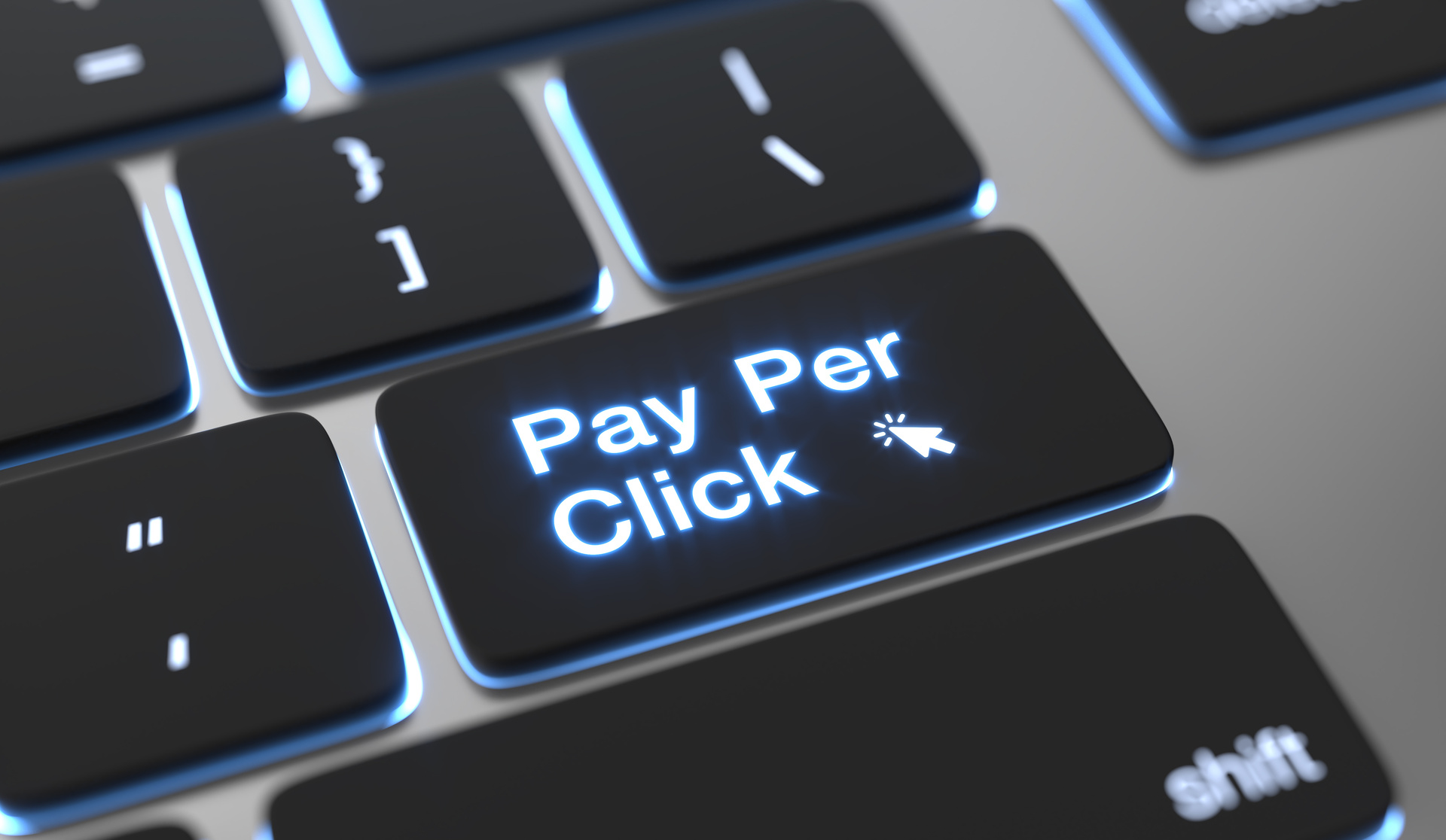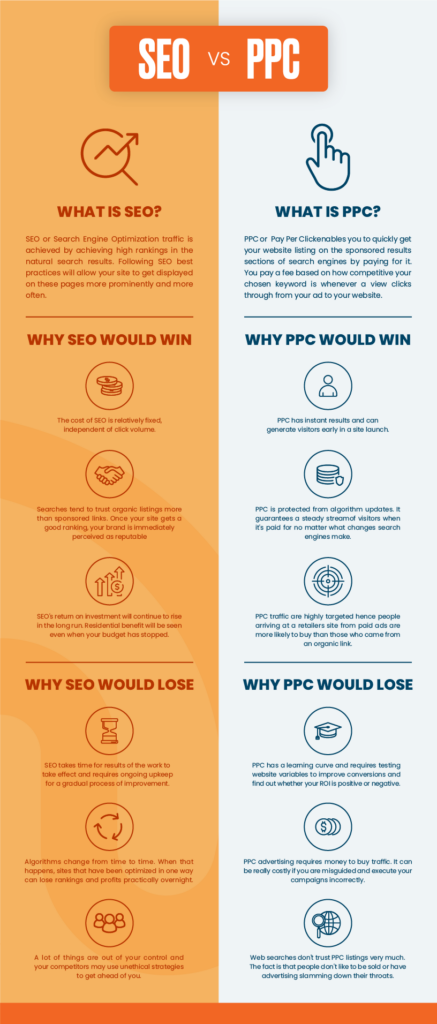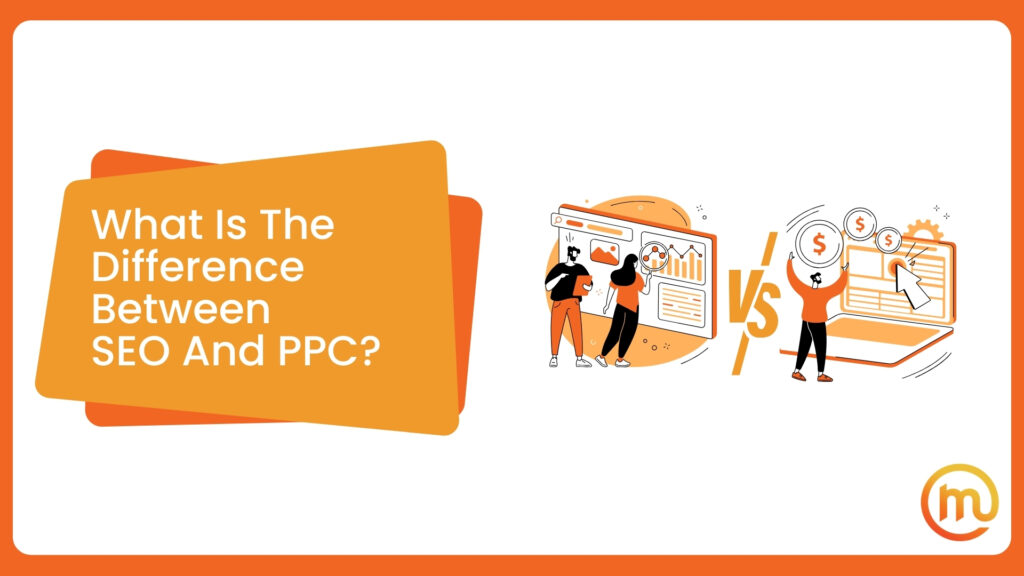What is the difference between SEO and PPC? Are they part of the same concept, or is there more to both? You don’t need to learn this by heart – hiring an SEO agency will work out much better. But knowing the difference between them will help you understand what kind of marketing you need.
SEO and PPC are digital marketing strategies. The first is very important for reaching organic traffic, while the second improves a company’s chances of getting noticed with paid advertisements. Most professional agencies use both methods to help a company grow, but that often depends on budget.
SEO vs PPC – Understanding the Advertising Mechanisms
If you notice the abbreviation SEM in your business strategy, that means that the digital advertising agency you hired is working hard on improving your Internet presence. SEM stands for Search Engine Marketing, and it encompasses both of the aforementioned strategies.
These strategies can and will help you grow, but they must be implemented correctly. You don’t have to hire the best SEO agency possible, but a great one with many reviews and feedback will surely take you where you want to be.
Before reading about the pros and cons of these digital strategies, it’s important to learn their meaning and purpose. That’s how you can get ahead of the competition and get acquainted with digital marketing trends for the year.
What Is SEO?
SEO stands for search engine optimization, and it’s pretty self-explanatory. It’s the practice of optimizing a website and its content to get it to rank on the first page of Google. The purpose is to make organic traffic better in the long run.
It can work in four areas – keyword research, on-page, off-page, and technical optimization. These four areas are worked on separately and are equally crucial for good functioning. Your keywords can be perfectly optimized, but if your technical optimization is bad, it’s harder to grow. Search engine optimization has many benefits for businesses.
The Four Areas of Search Engine Optimization
Let’s take a closer look at each of the four areas of optimization.
- Keyword research – this is a process in which an agency looks into the words and phrases your target audience uses when searching for services or products. If you sell organic cosmetics, “organic cosmetics” will be the keyword or phrase for your business. However, chances are its ranking volume is huge, so you work on adding more similar keywords that will help you rank better and stand out,
- On-page optimization – this is the practice of improving your website to match the most common queries in your category. Your site becomes more relevant and directly connected to the query results by improving your on-page stats. Researching a so-called “search intent” means you’re attempting to align your content with frequent queries,
- Off-page optimization – this is optimization done outside of your website, which is also important for ranking. It isn’t always within your power, but it does a world of good. It’s similar to link building and entails your representation on other websites. When you link an external site in a blog, that’s called backlinking; if other sites backlink to yours, your ranking grows and shows you’re trustworthy,
- Technical optimization – this part of the process allows Google and other engines to find your page and index it. There are also terms like crawling when Google grabs content from your page and finds other pages through links. This process has the goal of improving your rankings.
What Is PPC?
PPC is short for “pay-per-click,” and it’s the opposite of organic optimization. Instead of relying on free and organic queries, pay-per-click focuses on paying for reach. Whenever a consumer clicks on an ad, the company paying for it gets charged a fee. Essentially, the bigger your advertising revenue is, the more potential customers you have.
PPC is typically reflected in search ads, but there are also social media and display ads. For this to be implemented, there are four advertising strategies: keyword research, bid setting, ad creation, and audience targeting. These principles apply to social ads, too, barring keyword research. Most pay-per-click advertising is done for Google.
The Four Pillars of Pay-Per-Click
Let’s check out the four pillars of pay-per-click, the essential processes making this strategy great for companies:
- Keyword research – similar to research done for search engine optimization, you have to choose keywords that you want to target in pay-per-click marketing,
- Bid setting – this part of the campaign can be the most essential since you’re setting how much you’re willing to pay Google for an ad. This is a bidding war, meaning that if you’re outbid, your ads won’t be shown as much,
- Ad creation – when you reach this step, you’re also creating your advertisement. This is where you design and create what people will see when they encounter your ad. Each ad is given a Quality Score,
- Audience targeting – this is where you can decide who can see your ads; you can filter them to people of a certain age, from a specific country, or speaking a particular language. Some targeting can be done according to interests, keyword searches, and online engagement.

What Is the Difference Between SEO and PPC?
If you’re still wondering what is the difference between PPC and SEO, here’s a quick rundown – the first focuses on improving your online presence and organic query results, and the second gives you a paid advantage. Search engine optimization is common and one of the best ways to improve your business, especially local SEO.
Pay-per-click is also quite common, but some companies can’t always afford a high volume of ad clicks since they pay every time a potential client clicks on their ads. Although customers clicking on the ads is a desirable outcome, it can also bankrupt you if engagement is low. That’s why you must also target the right keywords and people.
The difference between these strategies is often minimal, as they provide almost the same results. One isn’t better than the other since they’re often combined to improve a company’s online presence and reputation.
However, one strategy will often make more sense than the other, so a lot depends on which one works best for your company. For example, if you have a product or service that’s uniquely innovative, it’s best to go the ads route to improve traffic and query results.
But if you’re a budding company that wants to build a reputation over a certain period, paid content won’t get you far. Instead, relying on search engine optimization for better results will prove more beneficial in the long term.

The Pros and Cons of Each Strategy
Naturally, a new and upcoming company won’t have the budget and time to implement both strategies simultaneously – most don’t. Instead, use an agency-recommended strategy or learn about their pros and cons and opt for one yourself.
Here’s what they both bring to the table.
The Pros of SEO – You Get Organic Traffic and Long-Term Results
The best advertisement is built on solid marketing legs. That’s what optimization can do for you and your website. Getting traffic to your page is challenging, but when done with quality content, time shows how beneficial optimization can be. It’s the unsung hero of getting views; who knew keywords are the key to success?
Since optimization is slow and steady, the foundation will be almost unbreakable once you reach higher numbers. There won’t be any mistakes in your on-page or off-page optimization, and your keywords will be perfected. If you have time (which every company needs,) this method will help you win over numerous clients.
The Cons – Competitive Keywords
Sadly, keywords can often be a double-edged sword. If you plan to sell a product or service that already has a high-ranking competitor on the market, it’s tough to say how well you can rank compared to them. This is where the slowness of optimization takes a hit, and keyword optimization gets pulled over.
Say you’re a fashion designer and want to sell some evening wear. Your primary keywords will be “evening wear” and “evening fashion,” alongside other relevant phrases, but you can see they’re pretty competitive. Considering how many brands, especially high-fashion ones, sell such clothing, you’re in for a long and tough journey.
The Pros of PPC – Quick and Specific
Paid advertising is a much quicker way to get traffic to your website. You can start a campaign immediately by heading to Google Ads or any other ad platform. That’s great because you don’t need a lot to get started, and the time spent on it is minimal.
A great social media agency will help you jumpstart your digital ad campaign, and if you’re thinking – why do I need them if it’s that easy? PPC is also specific, meaning it works on granular targeting – you can’t simply launch a digital marketing campaign without knowing your target audience.
It may be that easy, but it’s not, which is always the catch. Agencies know which demographics and key phrases to target.
The Cons – You’re Going to Need Lots of Money
Obviously, besides great targeting, paid campaigns require money. If you’re an up-and-coming business with low revenue, this method won’t work. Google Ads can easily drown your campaign if a competitor outbids you on a keyword or phrase; that’s just how it works.
That means you have to be the loudest in every room, even if you don’t have the voice for it. That’s often very exhausting and can lead to quick burnout – within the company ranks and in your wallet. Your paid ad campaign and budget need to be approved on all levels.

Which Strategy Does a Content Marketing Agency Use?
It’s impossible to say which content marketing agency prefers which strategy since most use both methods to improve a company’s rankings. You’ll notice the M.O. of advertising agencies if you see patterns in their work – some will rely on organic optimization, while others will dedicate themselves exclusively to paid promotion.
In our opinion, good marketing agencies know how and when to implement both methods. For example, a good website with engaging content needs all the following aspects:
- General, local, and YouTube SEO,
- Web design,
- Web development,
- PPC,
- Content writing,
- Social media management.
A great marketing agency, such as Made Online, can provide every aspect listed above. Our experts understand the importance of optimization for the long term, the ease and beauty of excellent web development and design, and the marketability of a well-written blog.
Together, all these aspects make a perfect combination and lead any company to bigger and better things. If you contact Made Online today, you’ll see how a professional SEO agency works to improve your reach and achieve lasting results.

Follow Tips From a Great Marketing Agency to Understand Your Ad Campaign
Now that you’re fully in the loop about what’s good to do for your business, you can decide which of the strategies works best or let professionals decide. Our advice is to consult an agency regardless, as they can present palpable plans for improvement without endangering your money or time.
Before anything else, you must know what you’re selling and your target audience. You can’t successfully run a business without visualizing a stable and solid identity beforehand. Once you’re confident in your product or service, you’ll have what it takes to get the best ad campaign on the Internet.

